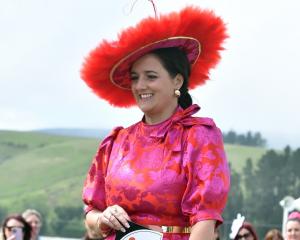
Lisa Scott is wearing nothing until she finds out where it came from.

Dropping the economist off to work, clad in my ratty dressing gown, makeup-less, hair sleep-dreadlocked, I wondered, ‘‘Do other women make this shameful commute? Do the police pull them over too, for failing to indicate, only to hastily reconsider: ‘Please step out of the car. Look at the state of you. Step back into the car, Lady. Back. In. The. Car!'.''
I have nothing to wear. Rather, I am choosing to wear nothing (I should be easy to spot, freckles luminesce in cold weather) until I find out where it came from. Who made my clothes? Who grew the cotton, spun the threads and sewed them together? Was my favourite blouse made by someone forced to work overtime and breathe in dangerous chemicals? Did she face dismissal if she became pregnant or ill? Was the fire escape of the factory she worked in padlocked? Is there cruelty in my closet?
It's been three years since 1134 garment workers were killed and a further 2500 people injured when the Rana Plaza complex in Dhaka, Bangladesh, collapsed. Bodies were found huddled in stairwells, trying to protect each other. Not an unexpected disaster; cracks had already appeared in the walls of the building and an engineer had deemed it unsafe. In the wake of the international outcry that followed, there have been changes to safety regulations and a 77% increase in the minimum wage for garment workers in Bangladesh, bringing it up to $68 a month. But the world is filled with horror, outrage quickly dims and I've just spent four times that on a winter coat.

Don't tell the economist. An almost pathological hoarder, the economist's wardrobe is the epitome of sustainable fashion. Everything he buys is already second-hand, and his refusal to part with it (ever) means nothing sees a landfill. Having also gymnastically gone out of his way to avoid breeding, he might be the greenest person I know.
More of a crimson myself, when younger everything I wore was a wacky assemblage of ‘‘vintage'' (i.e. various dead persons' leftovers: ill-fitting, a bit smelly). Lately, though, I've started to want nice things. A dress that is mine alone and ‘‘on trend''. Maybe it's a reaction against former poverty, or maybe it's just that as you get older you get crappier and more selfish; conveniently forgetting that slaves to fashion beget actual slaves.
Last year, New Zealanders spent almost $5 billion on clothing and footwear. Despite how often we're willing to put our hands in our pockets, we know very little about who stitched said pocket on. And we want to: a 2014 Colmar Brunton survey found 90% of New Zealanders were keen to buy ethically and socially responsible products (I don't care to meet the 10% who answered, ‘‘Yeah, nah, I don't mind a bit of child labour''), they just find it hard to identify the good guys.
Enter Bec McMaster. Visiting the Brooklyn Fashion + Design Accelerator on a fellowship last year, a giant penny dropped. Long motivated to do something about climate change, she had been hunting for that one ‘‘thing'' everyone engages with every single day, regardless of paycheque, age, gender or education, and with the apparel industry accounting for 10% of worldwide carbon emissions, she realised clothing was that thing.
But how to provide trusted information easily? Searching for a solution, Bec discovered Good On You, Australia's premier ethical fashion app. It can be tailored to people's personal style and values and locate the closest retailer. Best of all, you can send a message to brands on the app, congratulating them or urging them to do better.
Able to provide ethical ratings for more than 350 New Zealand fashion brands, with a five-point ratings system (informed by reputable third-party certifications like the Global Organic Textile Standard) focused on the brands' impact on people, the environment and animals, Dunedin's Sustainable Projects has launched a month-long PledgeMe campaign (ending May 22) seeking $12,000 to customise the app specifically for New Zealand retailers and consumers. Funds go towards back-end development allowing the app to work in both countries, gathering brand and retailer data, validating brand ratings and initial support and maintenance. The app will be launched for free this August, pending successful crowdfunding. As PledgeMe is all-or-nothing, if they don't make the target, they will get zip.
Who made my coat? If Good On You were available here, I could tell you. So head to the PledgeMe campaign: pldg.me/goodonyou or attend the fundraising screening of the fashion documentary The True Cost on Tuesday at the Dunedin School of Art. Because this dressing gown is starting to smell.











